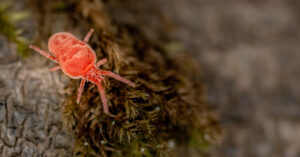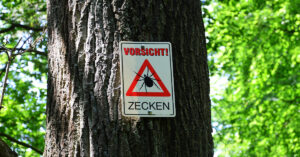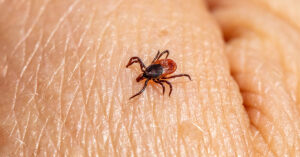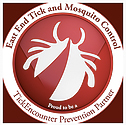 There are many people who hold a sincere belief that ticks – and tick-related diseases – are fairly recent threats. They remember a childhood blissfully unconcerned about tick bites and unencumbered by tick precautions or tick checks. While burgeoning tick populations are increasing the likelihood of encountering a present-day tick threat, ticks are actually an ancient species… and tick-vectored diseases have been around for eons.
There are many people who hold a sincere belief that ticks – and tick-related diseases – are fairly recent threats. They remember a childhood blissfully unconcerned about tick bites and unencumbered by tick precautions or tick checks. While burgeoning tick populations are increasing the likelihood of encountering a present-day tick threat, ticks are actually an ancient species… and tick-vectored diseases have been around for eons.
Is the Lone Star Tick Spreading?
 Long Island is experiencing a lone star tick population explosion. These bloodthirsty arachnids (Yes, ticks are Arachnids!) have spread north and west from the American southeast, and are now a viable threat throughout nearly two-thirds of the country. They have been on Long Island for decades and are thriving due to a warming climate that allows for a longer breeding season. The East End is a hotbed of tick activity, and Suffolk County has one of the highest rates of tick-borne illness in the nation.
Long Island is experiencing a lone star tick population explosion. These bloodthirsty arachnids (Yes, ticks are Arachnids!) have spread north and west from the American southeast, and are now a viable threat throughout nearly two-thirds of the country. They have been on Long Island for decades and are thriving due to a warming climate that allows for a longer breeding season. The East End is a hotbed of tick activity, and Suffolk County has one of the highest rates of tick-borne illness in the nation.
Female lone star ticks grow to approximately ¼ inch long, expanding to around twice that size after feeding. They are reddish-brown in color with a distinctive light-colored star on their backs. Adult males are a bit smaller, with whitish spots around the outside of their bodies. Female lone star ticks feed on blood meals and transmit diseases – including ehrlichiosis, alpha-gal syndrome, heartland virus, and an emerging bacterial infection called STARI.
Is Lyme Disease A Man-Made Disease?
 In the wake of the COVID-19 pandemic, many people have been rethinking how diseases emerge and are transmitted to humans, oftentimes overlooking or ignoring scientific proof to the contrary. Fueled by its relatively recent identification in the 1970s and rapid growth since then, it has become fashionable in conspiracy-minded circles to suggest that Lyme disease may be a man-made illness.
In the wake of the COVID-19 pandemic, many people have been rethinking how diseases emerge and are transmitted to humans, oftentimes overlooking or ignoring scientific proof to the contrary. Fueled by its relatively recent identification in the 1970s and rapid growth since then, it has become fashionable in conspiracy-minded circles to suggest that Lyme disease may be a man-made illness.
This ignores all scientific evidence as well as the historical record. Lyme disease actually is thousands of years old, and its spread across the United States is inextricably tied to the country’s settlement and migration patterns. It is not a recent phenomenon, nor was it human-created or lab-mutated.
Do Fire-Dependent Ecosystems Reduce Ticks and Tick-Borne Diseases?
 It’s springtime on Long Island, which means the return of prescribed fire season. The New York Department of Environmental Conservation plans burns in four heavily wooded areas in Suffolk County alone. These burns are required by law and are not subject to Long Island’s seasonal burn ban.
It’s springtime on Long Island, which means the return of prescribed fire season. The New York Department of Environmental Conservation plans burns in four heavily wooded areas in Suffolk County alone. These burns are required by law and are not subject to Long Island’s seasonal burn ban.
Prescribed fires are a critical part of forest management… one that can help prevent uncontrolled fires from occurring. Longtime residents may remember devastating wildfires that occurred in the East End’s Pine Barrens – scorching thousands of acres, injuring firefighters, spurring evacuations, and damaging homes in the area.
Controlled burns also aid in pest management. How? By reducing the number of pathogen-carrying species like the forest-dwelling ticks that bedevil so much of Long Island’s East End.
How Humidity Impacts Tick Numbers and Diseases
 Ticks are a problem, but also a fact of life when living in Suffolk County. There are several tick varieties – including the American Dog Tick, the Lone Star Tick, and the Blacklegged Tick – that each present their own unique threats as they are associated with spreading different diseases. And unfortunately, there are precious few days over the course of the year where they are not a concern… as they remain active in temperatures above 40 degrees.
Ticks are a problem, but also a fact of life when living in Suffolk County. There are several tick varieties – including the American Dog Tick, the Lone Star Tick, and the Blacklegged Tick – that each present their own unique threats as they are associated with spreading different diseases. And unfortunately, there are precious few days over the course of the year where they are not a concern… as they remain active in temperatures above 40 degrees.
That said, there are other environmental factors that help to determine how active ticks are at any given point. Temperature does play a role, as well as humidity. So, do ticks prefer lower or higher levels of humidity?
Travel Tips After the First Travel Tick-Related Death in the U.S.
 You may have seen the recent headlines – an American citizen contracted the tick-borne Powassan virus (while traveling to Canada) and passed away upon returning home. While shocking, it isn’t surprising.
You may have seen the recent headlines – an American citizen contracted the tick-borne Powassan virus (while traveling to Canada) and passed away upon returning home. While shocking, it isn’t surprising.
Tick-borne illnesses are spreading into new regions – including parts of the northern U.S. – where there already have been fatalities. Powassan is still relatively rare, but there are other tick-borne illnesses that can cause severe symptoms and even result in death.
Whether you stay at home on Long Island or travel to another region, you should be aware of tick-related diseases in the area and take precautions to avoid tick encounters.
Tick-Borne Diseases: Ehrlichiosis
 When it comes to tick-borne illnesses, Lyme disease tends to garner the headlines with its long-term health consequences and high-profile sufferers. It’s easy to forget that there are other potentially debilitating infections transmitted by ticks.
When it comes to tick-borne illnesses, Lyme disease tends to garner the headlines with its long-term health consequences and high-profile sufferers. It’s easy to forget that there are other potentially debilitating infections transmitted by ticks.
One of those diseases is Ehrlichiosis, a tick-borne bacterial illness that can be transmitted to humans – as well as to domestic and wild animals. In recent years, it has become particularly problematic in dogs.
Are Lyme Disease Tests Accurate?
 Diagnosing Lyme disease can be frustrating for medical professionals and patients alike. Testing is notoriously unreliable, and both false negative and false positive results abound.
Diagnosing Lyme disease can be frustrating for medical professionals and patients alike. Testing is notoriously unreliable, and both false negative and false positive results abound.
Meanwhile, some cases of Lyme disease have seemingly clear early signs while others may have no symptoms at all until much later. All of which make prompt diagnosis and treatment that much harder. With imperfect testing and symptoms similar to so many other illnesses, how likely is it that a Lyme test result will be accurate?
Are Ticks on Every Continent?
 Due to a changing climate, forest management issues, and other factors… tick habitats are expanding, and tick populations are booming. Unfortunately, more ticks mean more instances of tickborne disease.
Due to a changing climate, forest management issues, and other factors… tick habitats are expanding, and tick populations are booming. Unfortunately, more ticks mean more instances of tickborne disease.
In the past 20 years, cases of some tickborne illnesses have nearly doubled. It seems like it’s impossible to avoid these parasitic arachnids – even in urban areas. Is there anywhere in the world that’s safe from ticks?
Do Ticks Prefer a Blood Type?
 Do you ever feel like you’re a tick magnet? Do you seem to attract ticks every time you cut the grass or take a walk in the woods? Or, perhaps, you’re one of the lucky ones who rarely finds a tick on your clothes or skin.
Do you ever feel like you’re a tick magnet? Do you seem to attract ticks every time you cut the grass or take a walk in the woods? Or, perhaps, you’re one of the lucky ones who rarely finds a tick on your clothes or skin.
Why does it seem like ticks gravitate towards some people but not others? Do ticks have preferences? Actually yes, they do! There is scientific evidence that ticks prefer certain blood types (and certain species) over others.
- 1
- 2
- 3
- 4
- Next Page »





